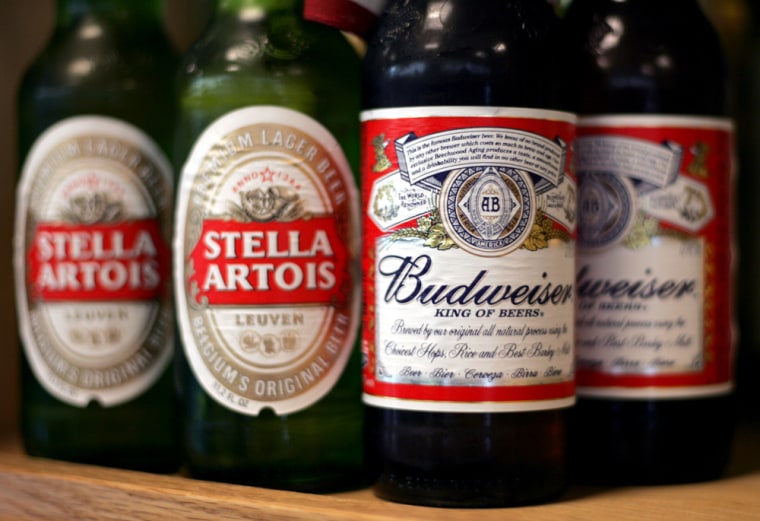Shareholders of Anheuser-Busch Cos. Inc. approved the $52 billion sale of the business to Belgium-based InBev SA on Wednesday, a deal that is set to create the world’s largest brewer.
The vote was the latest step necessary to form the company that will be known as Anheuser-Busch InBev and combine brands such as Bud Light and Budweiser with Stella Artois and Beck’s. The deal, reached in July, is expected to close by the end of the year. It is subject to regulatory approval in the U.S., Britain and China.
August A. Busch IV, Anheuser-Busch’s president and chief executive, said the decision to sell the nation’s largest brewer was a difficult one.
“Every alternative was considered,” he told shareholders at the meeting just outside of New York. “In the end, we all agreed the InBev proposal was in the best interest of you, the shareholders.”
The new company brings about the end of the more than 150 years of family rule of the St. Louis-based company, though the newly combined company’s North American headquarters will stay there. InBev has said it will keep open all 12 of Anheuser-Busch’s North American breweries.
Busch will move into a non-executive role, but will be on the new company’s board. He said he was excited about the future of the new company, especially expanding the brands worldwide, which he said helps in “fulfilling the global ambition of my family.”
Not all shareholders were pleased, though.
Shareholder Rebecca Mance of Danville, Calif., cried after the vote and told shareholders and executives it marked the end of an era.
“There is something here that matters more than money,” Mance said, adding “market share will dwindle.”
“I am a consumer and in truth I won’t buy it anymore,” she said of the company’s brands.
Anheuser-Busch agreed this summer to accept the buyout from InBev worth $70 a share. The deal ended back-and-forth wrangling between the two sides, with Anheuser-Busch spurning InBev’s unsolicited offers at first, claiming they were bad for business and were an “illegal scheme” that threatened to defraud shareholders.
InBev shareholders approved the deal in September.
The sale price is a premium to Anheuser-Busch shareholders over the company’s current stock price. On Wednesday, its shares fell 51 cents to close at $66.33. InBev said last week it will not reduce or change its $70-a-share offer, even though Anheuser-Busch’s share price has dropped amid larger market turmoil.
The deal gives InBev a key inroad to the U.S. market, where Anheuser-Busch dominates with about a 50 percent share. InBev, meanwhile, has a small fraction. It also gives the company about one-fifth of the markets in China and Russia, two areas poised for growth.
InBev has said it wants to tap into Anheuser-Busch’s marketing power and make its top-selling Budweiser and Bud Light brands into global powerhouses like Coca-Cola or Pepsi.
Leadership for the new company has already been decided, pulling from executives within both companies. Luiz Fernando Edmond will lead North American operations, leaving his post as InBev’s president of Latin America North.
David A. Peacock, an Anheuser-Busch vice president, will become Anheuser-Busch president and oversee U.S. operations and management of the Budweiser and Bud Light brands.
About 100 people attended the meeting Wednesday, among them longtime workers who also hold shares.
Mark Dingelstedt, who retired in January after working for 25 years in production at Anheuser-Busch’s Newark, N.J. facility, said although he will “make a few dollars” on the deal, he was sad to see the brewer be taken over by an international company.
“We used to be the great American beer company,” he said. “We’re going to lose that, I feel.”
Mike Messina, who has worked at the Newark facility for the last 18 years, said he wasn’t sure what would change once the new management takes over.
“It’s kind of sad,” Messina said. “I never thought I would see this.”
In St. Louis, where the company and its heritage play a big role in the community, some residents were sad about the vote, even though they knew it had been coming. Becky O’Brien, 59, was eating lunch at a restaurant near Anheuser-Busch’s brewery complex.
“I think people are having a hard time with it, because now it’s finalized,” said O’Brien, who works in the city and lives in the suburb of Florissant. “It’s like the grieving process, something we have to go through. There are certain things you’re proud of in your city — the Arch, the brewery, Busch Stadium. It seems to be a loss.”
